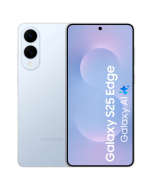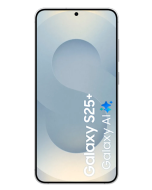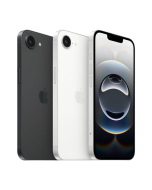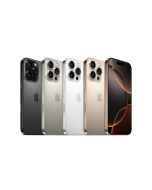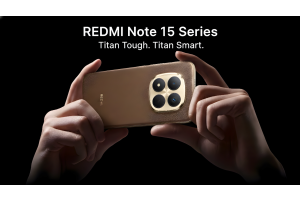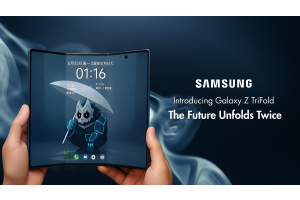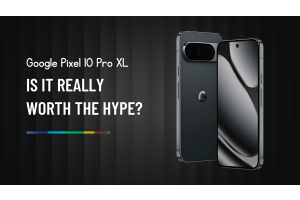
The smartphone market in 2025 is heating up, with Apple and Samsung pushing the boundaries of design, performance, and technology. This year, Apple launched the iPhone Air, an ultra-thin device powered by the A19 Pro chip, bringing flagship performance to a lightweight form factor. Just months earlier, Samsung introduced the Galaxy S25 Edge, a sleek and powerful device with impressive specifications and a curved-edge display.
Both phones are marketed as slim, high-performance devices, but which one should you pick? In this comparison, we’ll break down their design, display, camera, performance, battery, AI features, and pricing, helping you make an informed choice.
1. Design & Build Comparison
When it comes to design, both phones push the boundaries of slim and stylish.
The iPhone Air is Apple’s thinnest iPhone ever, measuring just 5.6 mm in thickness and weighing 165 grams. It features a titanium frame and Ceramic Shield 2 protection on both front and back, making it 4x more crack-resistant than previous models. Its flat edges and premium finishes in Sky Blue, Light Gold, Cloud White, and Space Black give it a modern, elegant look.
The Galaxy S25 Edge is slightly thicker at 5.8 mm Saand weighs 163 grams, giving it a light and comfortable feel in the hand. It features aluminium edges with Gorilla Glass Ceramic 2 on the front and back. Its curved edges offer a different aesthetic and ergonomic grip. Colours include Titanium Silver and Titanium Jetblack, providing a professional and understated look.


Design Comparison Table
|
Feature |
iPhone Air |
Galaxy S25 Edge |
|---|---|---|
|
Thickness |
5.64 mm |
5.8 mm |
|
Weight |
165 g |
163 g |
|
Material |
Titanium frame, Ceramic Shield 2 front & back |
Aluminum frame, Gorilla Glass Ceramic 2 |
|
Colours |
Sky Blue, Light Gold, Cloud White, Space Black |
Titanium Silver, Titanium Jetblack |
|
Edge Style |
Slightly curved |
Flat |
|
Durability |
4x crack-resistant back, 3x scratch-resistant front |
Standard high durability |
Verdict: The iPhone Air edges out in ultra-thin design and premium titanium construction, while the Galaxy S25 Edge offers slightly lighter handling and curved-edge ergonomics.
2. Display Comparison
The display is where you truly experience the magic of these flagship devices.
The iPhone Air sports a 6.5-inch Super Retina XDR OLED display with a 2736 x 1260 resolution and a 460 ppi pixel density. It features ProMotion technology, allowing refresh rates from 10Hz to 120Hz, and a peak brightness of 3,000 nits outdoors. Apple’s True Tone, wide color P3 support, and Haptic Touch make the screen vibrant and responsive.
The Galaxy S25 Edge has a slightly larger 6.7-inch Dynamic AMOLED 2X display with 3120 x 1440 Quad HD+ resolution. It supports a 120Hz refresh rate, HDR10+, and maximum brightness levels up to 1,500 nits, providing crisp visuals and vivid colors. Its curved edges add style and immersive viewing, though some users may prefer flat screens for touch accuracy.


Display Comparison Table
|
Feature |
iPhone Air |
Galaxy S25 Edge |
|---|---|---|
|
Display Size |
6.5-inch |
6.7-inch |
|
Resolution |
2736 x 1260, 460 ppi |
3120 x 1440 (Quad HD+) |
|
Display Type |
Super Retina XDR OLED |
Dynamic AMOLED 2X |
|
Refresh Rate |
10–120Hz ProMotion |
120Hz |
|
HDR Support |
HDR10, Dolby Vision |
HDR10+ |
|
Brightness |
1,000 nits typical, 3,000 nits peak outdoor |
1,500 nits peak |
|
Special Features |
True Tone, Wide color P3, anti-reflective, fingerprint-resistant |
Adaptive brightness, colour calibration, curved edges |
Verdict: For ultra-bright, outdoor viewing and smooth animations, the iPhone Air takes the edge. But Samsung offers a larger screen with slightly higher resolution, perfect for streaming or gaming.
3. Camera Comparison
Camera performance is often a decisive factor, especially for users who enjoy photography or content creation.
The iPhone Air features a 48MP Fusion Main camera with 2x telephoto zoom, sensor-shift optical image stabilization, and advanced software features like Photographic Styles, Night Mode, and Clean Up. The 18MP Center Stage front camera keeps subjects centred in video calls or selfies, while Dual Capture allows simultaneous front and rear recording. Video support includes 4K Dolby Vision at 60fps and Action Mode for ultra-stable footage.
The Galaxy S25 Edge has a dual rear camera setup, including a 200MP main sensor and a 12MP ultra-wide lens. It supports 2x optical zoom and 10x digital zoom, with 8K video recording at 30fps. Its 12MP front camera is slightly lower resolution than the iPhone Air but still performs well in most lighting conditions.


Camera Comparison Table
|
Feature |
iPhone Air |
Galaxy S25 Edge |
|---|---|---|
|
Rear Camera |
48MP Fusion Main, 2x Telephoto |
200MP Main + 12MP Ultra-wide |
|
Front Camera |
18MP Center Stage |
12MP |
|
Zoom |
2x optical, 10x digital |
2x optical, 10x digital |
|
Video |
4K Dolby Vision 60fps, Action Mode, Dual Capture |
UHD 8K 30fps, Slow motion FHD 120/240fps |
|
Special Features |
Night mode, Photographic Styles, Next-gen portraits, Clean Up |
AI scene detection, Night mode, Ultra-high-resolution photos |
|
AI Features |
Center Stage, Visual intelligence, Genmoji |
AI-assisted photography & display optimisation |
Verdict: For portrait photography and pro-style video recording, iPhone Air shines. For ultra-high-resolution photos and 8K video, Samsung is the winner.
4. Performance Comparison
Both devices are top-of-the-line performers, capable of handling gaming, multitasking, and AI-driven features smoothly.
The iPhone Air runs on the A19 Pro chip with a 6-core CPU, 5-core GPU, and 16-core Neural Engine. It features 12GB RAM and the C1X modem, making it one of the fastest and most power-efficient iPhones ever. Apple Intelligence enhances workflows, gaming, and photography.
The Galaxy S25 Edge is powered by the Snapdragon 8 Elite SoC with 12GB RAM. It supports AI features for battery optimization, camera processing, and smart connectivity. Both phones can handle AAA games and graphics-intensive apps effortlessly.


Performance Comparison Table
|
Feature |
iPhone Air |
Galaxy S25 Edge |
|---|---|---|
|
Chipset |
A19 Pro, 6-core CPU, 5-core GPU, 16-core Neural Engine |
Snapdragon 8 Elite, Octa-core CPU, 12GB RAM |
|
RAM |
12GB |
12GB |
|
AI Acceleration |
Neural Engine, Apple Intelligence |
AI Camera, Smart Battery, Voice Assistant |
|
Gaming Performance |
AAA titles, smooth graphics |
AAA titles, high FPS, GPU-heavy tasks |
|
OS |
iOS 26 |
Android 15 (One UI) |
Verdict: For everyday productivity and AI-enhanced editing, iPhone Air has a slight edge. Samsung provides more connectivity flexibility and high-end gaming support.
5. Battery & Charging Comparison
Battery life and charging options are essential for heavy users.
The iPhone Air features an estimated 3,149 mAh battery, capable of up to 27 hours of video playback or 40 hours with the MagSafe battery accessory. It supports fast charging up to 50% in 30 minutes, wireless charging, and Apple’s optimized power management.
The Galaxy S25 Edge has a larger 3,900 mAh battery, supporting up to 24 hours of video playback. Fast charging is supported, and it also offers Qi wireless charging.


Battery Comparison Table
|
Feature |
iPhone Air |
Galaxy S25 Edge |
|---|---|---|
|
Battery Life (Video Playback) |
Up to 27 hours |
Up to 24 hours |
|
Video Playback with Accessories |
Up to 40 hours (MagSafe battery) |
N/A |
|
Fast Charging |
50% in 30 mins with 20W+ adapter |
Fast charging supported |
|
Battery Capacity |
~3,149 mAh |
3,900 mAh |
|
Wireless Charging |
MagSafe |
Qi Wireless |
Verdict: If you want all-day usage and MagSafe convenience, iPhone Air wins. For a slightly larger battery with solid life, the Galaxy S25 Edge is reliable.
6. AI & Smart Features
Both phones are packed with AI-driven features to enhance usability.
-
iPhone Air: Features Center Stage, Genmoji, Clean Up, Live Translation, and emergency features like Crash Detection and Emergency SOS via satellite. Its AI integrates deeply into the Apple ecosystem, making apps and workflows smarter.
-
Galaxy S25 Edge: Offers AI-assisted photography, smart battery management, voice assistant, and device optimization. It provides flexibility through Android and Samsung’s ecosystem, including Dual SIM and connectivity options.


AI Comparison Table
|
Feature |
iPhone Air |
Galaxy S25 Edge |
|---|---|---|
|
Photo AI |
Clean Up, Photographic Styles, Next-gen Portraits |
AI scene detection, Night mode |
|
Video AI |
Dual Capture, Action Mode |
AI stabilisation, real-time filters |
|
Device AI |
Crash Detection, Emergency SOS via Satellite, Live Translation, Genmoji |
AI battery optimisation, voice assistant, smart connectivity |
|
Ecosystem Integration |
Deep integration with Apple apps and devices |
Samsung ecosystem + Android flexibility |
Verdict: iPhone Air excels in AI for photography, video, and emergency services, while Galaxy S25 Edge shines in system-level AI for battery and camera.
Conclusion: Who Should Buy Which?
-
Choose iPhone Air if: You are invested in Apple’s ecosystem, want pro-level performance, AI-enhanced photography, and a durable titanium design. Perfect for users who value a polished feel and seamless integration with iOS devices.
-
Choose Galaxy S25 Edge if: You want a larger, higher-resolution display, 200MP camera for ultra-detailed shots, flexible connectivity, and a slightly lower price. Ideal for Android enthusiasts who love customization and high-end media consumption.
Ultimately, both phones redefine what a slim, powerful smartphone can be. Your choice depends on brand preference, camera priorities, and budget.




